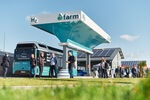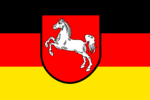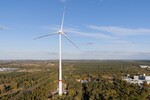08/22/2008
Germany - International wind industry presents new developments,
The world’s main wind power event will take place from 9 to 13 September 2008 at HUSUM WindEnergy. More than 700 companies, universities and scientific institutions from 35 countries will present their latest products and services at the leading international wind fair. The prime wind event focuses on onshore as well as offshore technology developments and scientific wind industry advancements, and will be held in the Northern German coastal town Husum. All major wind turbine manufacturers will inform visitors in Husum about their latest products, services and worldwide projects. Also the world’s key component manufacturers will be present at the trade fair. HUSUM WindEnergy 2008 has for the first time been organised as a cooperation venture between the Messe Husum and the Hamburg Messe. This press release offers a pre-view of some expected wind technology innovations and other wind industry news from the fast expanding international wind energy sector.
Heavy components
A 45-tonne nacelle of the sub-megawatt class 900 kW Conergy PowerWind 56 wind turbine is among the heaviest steel structures and metal components that will be on display in Husum. Equally impressive in terms of component mass is a 33-tonne wind turbine gearbox that will be brought to Husum by the leading Finnish supplier Moventas. Exhibitor US based GE Transportation will display a 20-tonne gear motor unit, while the world’s largest gearbox supplier Winergy of Germany will show a gearbox with generator combination with similar impressive total mass. Emerging supplier Innovative Windpower based in Bremerhaven, Germany, for the first time shows its novel 20-tonne ITGS (Integrated Tubular Gear System) geared drive train to the public. The drive is part of the company’s new Falcon 1.25 MW wind turbine. Other major control and drive system hardware examples can be admired at the booth of bearing supplier IMO of Germany. Cast iron rotor hubs are displayed by at least three different manufacturers: Sankana of Spain, AH Industries of Denmark, and Jianying of China. Ingeteam of Spain shows it latest wind turbine generator development in Husum.
With regard to new wind turbine models an increasing number of leading suppliers and Husum exhibitors is either working on or has already commercially available products in the 2.5 to 3.5 MW class. Both are expected to turn into major future wind turbine volume class segments. Examples of new turbine types in the 2.5 MW class all featuring 100-metre size rotors include GE’s 2.5xl, the Vensys 100, Nordex N100, and Fuhrländer FL2500. Turbines with comparatively large rotors substantially raise yield potential at medium and low-wind speed sites.
Large and small turbines
An interesting new development is the 3 MW Alstom-Ecotecnia ECO 100, of which a prototype operates in Spain. The company will be present on HUSUM WindEnergy, also the world’s fourth largest wind turbine supplier Enercon of Germany comes with news. It recently erected a 30 kW direct drive stall control E-10 prototype, thereby further expanding its product range downwards. A genuine E-20 wind technology novelty is the application of a cast aluminium rotor blade. Claimed advantages include easier recycling compared to common state of the art epoxy-based composite material blade equivalents, and a smoother running due to a higher mass moment of inertia of the aluminium rotor.
Direct drive
Siemens Wind Power of Germany recently erected the first out of two so-called 3.6 MW direct drive Concept turbines in Denmark. The company says to realize that direct-drive wind turbines may become competitive with geared turbines for large turbine sizes. It therefore wants to get hands-on experience with direct-drive technology in order to conclude whether it can be made competitive with geared technology, and if so from what power level. According to well-informed wind industry sources several leading wind turbine suppliers and Husum exhibitors as a trend are now working on new direct drive models. These projects are especially aimed at the multi-megawatt class power range and demanding offshore application. Husum exhibitor Emergya Wind Technology (EWT) markets a 900 kW turbine to with enlarged 54-metre rotor size and it announced development of a direct drive wind turbine in the 2 MW segment.
Gamesa of Spain has been working for years on a 4.5 MW geared G128-4.5MW (rotor diameter 128m) flagship turbine that will among others feature segmented rotor blades. The company may disclose further details in Husum.
Vergnet of France has developed an innovative 1 MW turbine with two blades. Named GEV HP the lightweight turbine is suitable for regions with limited transport logistics. The rotor can be lowered to ground level at locations with a high hurricane risk, but this capability is also beneficial for enabling easy installation, and for ground-level maintenance.
Concrete tower innovation
For hub heights in excess of 100 metres yield gain per extra metre tower is in the range of 0.75%. In anticipation of new opportunities Husum exhibitor Advanced Tower Systems (ATS) of the Netherlands developed an innovative concrete – tubular steel hybrid tower concept. The patented conically shaped structure features a square cross section with rounded corners, while the lower concrete part is vertically divided into segments each made of pre-cast concrete. The prototype comprises a 133-metre hub height, of which the upper 55-metres is composed of a tubular steel section. ATS plans to erect the prototype tower at the Windtest wind turbine test field at Grevenbroich with on top a 2.3 MW Siemens turbine (93-metre rotor diameter).
Other developments
In Husum Spanish company MLS will present a new wind turbine pitch control system named i-PITCH, with a design focus on optimised turbine availability. The modular concept comprises dedicated hardware and software, and aims at multi-megawatt class wind turbines, both onshore and offshore.
The German Fraunhofer Wilhelm-Klauditz institute for wood research developed a wind turbine rotor blade failure-diagnosing tool based on non-destructive infrared thermograph technology. The portable system moves over a blade surface that as a result locally heats up. As a next step an infrared camera films a heat reflection image of the area. In case of a laminate defect the amount of heat reflected is substantially higher. The system both saves time and offers superior fault detection capability compared to visual inspections. It can be applied for detecting typical composite-material imperfections such as air-enclosures, de-lamination faults and imperfect glue joints.
Benefiting from a wind industry outsourcing trend, Zarges Aluminium Systeme (ZAS) of Germany opened a wind power logistics distribution centre in Peitling, where 6,000 individual parts are being assembled and packaged together into 430 (sub) assemblies. The warehousing concept serves as a ‘super market’ for the wind industry. It operates according to a ‘Just In Time’ delivery principles known from the automotive industry. A ZAS speciality is the supply of assemblies and standardised inner modules that easy fit inside tubular steel towers, and are characterised by a minimised labour input requirement.
German 2D/3D laser equipment developer and producer Z-LASER offers dedicated laser systems to the wind industry. Laser systems can be applied for more precisely measuring and displaying patterns and/or shapes of specific objects. One specific rather new laser technology application is already in use at Enercon that applies it as a manufacturing support tool for the precise positioning of glass fibre layers inside rotor blade moulds.
An average wind turbine can contain up to 6,000 bolt joints. Hytorc-S, a division of German company Barbarino & Kilp GmbH, developed a new bolt pre-tensioning technology for wind turbine application that offers the promise of a maintenance-free joint. The system comprises among others an ‘intelligent’ mobile hydraulic pump unit that powers a ‘one-button’ hydraulic torque wrench suitable for a wide range of torque settings between 150 – 85,000 Nm. Key objective of the new technology is achieving a maximum bolt pre-tensioning value without sacrificing the optimal functioning of a specific joint, but by contrast elongating its service life.
Heavy components
A 45-tonne nacelle of the sub-megawatt class 900 kW Conergy PowerWind 56 wind turbine is among the heaviest steel structures and metal components that will be on display in Husum. Equally impressive in terms of component mass is a 33-tonne wind turbine gearbox that will be brought to Husum by the leading Finnish supplier Moventas. Exhibitor US based GE Transportation will display a 20-tonne gear motor unit, while the world’s largest gearbox supplier Winergy of Germany will show a gearbox with generator combination with similar impressive total mass. Emerging supplier Innovative Windpower based in Bremerhaven, Germany, for the first time shows its novel 20-tonne ITGS (Integrated Tubular Gear System) geared drive train to the public. The drive is part of the company’s new Falcon 1.25 MW wind turbine. Other major control and drive system hardware examples can be admired at the booth of bearing supplier IMO of Germany. Cast iron rotor hubs are displayed by at least three different manufacturers: Sankana of Spain, AH Industries of Denmark, and Jianying of China. Ingeteam of Spain shows it latest wind turbine generator development in Husum.
With regard to new wind turbine models an increasing number of leading suppliers and Husum exhibitors is either working on or has already commercially available products in the 2.5 to 3.5 MW class. Both are expected to turn into major future wind turbine volume class segments. Examples of new turbine types in the 2.5 MW class all featuring 100-metre size rotors include GE’s 2.5xl, the Vensys 100, Nordex N100, and Fuhrländer FL2500. Turbines with comparatively large rotors substantially raise yield potential at medium and low-wind speed sites.
Large and small turbines
An interesting new development is the 3 MW Alstom-Ecotecnia ECO 100, of which a prototype operates in Spain. The company will be present on HUSUM WindEnergy, also the world’s fourth largest wind turbine supplier Enercon of Germany comes with news. It recently erected a 30 kW direct drive stall control E-10 prototype, thereby further expanding its product range downwards. A genuine E-20 wind technology novelty is the application of a cast aluminium rotor blade. Claimed advantages include easier recycling compared to common state of the art epoxy-based composite material blade equivalents, and a smoother running due to a higher mass moment of inertia of the aluminium rotor.
Direct drive
Siemens Wind Power of Germany recently erected the first out of two so-called 3.6 MW direct drive Concept turbines in Denmark. The company says to realize that direct-drive wind turbines may become competitive with geared turbines for large turbine sizes. It therefore wants to get hands-on experience with direct-drive technology in order to conclude whether it can be made competitive with geared technology, and if so from what power level. According to well-informed wind industry sources several leading wind turbine suppliers and Husum exhibitors as a trend are now working on new direct drive models. These projects are especially aimed at the multi-megawatt class power range and demanding offshore application. Husum exhibitor Emergya Wind Technology (EWT) markets a 900 kW turbine to with enlarged 54-metre rotor size and it announced development of a direct drive wind turbine in the 2 MW segment.
Gamesa of Spain has been working for years on a 4.5 MW geared G128-4.5MW (rotor diameter 128m) flagship turbine that will among others feature segmented rotor blades. The company may disclose further details in Husum.
Vergnet of France has developed an innovative 1 MW turbine with two blades. Named GEV HP the lightweight turbine is suitable for regions with limited transport logistics. The rotor can be lowered to ground level at locations with a high hurricane risk, but this capability is also beneficial for enabling easy installation, and for ground-level maintenance.
Concrete tower innovation
For hub heights in excess of 100 metres yield gain per extra metre tower is in the range of 0.75%. In anticipation of new opportunities Husum exhibitor Advanced Tower Systems (ATS) of the Netherlands developed an innovative concrete – tubular steel hybrid tower concept. The patented conically shaped structure features a square cross section with rounded corners, while the lower concrete part is vertically divided into segments each made of pre-cast concrete. The prototype comprises a 133-metre hub height, of which the upper 55-metres is composed of a tubular steel section. ATS plans to erect the prototype tower at the Windtest wind turbine test field at Grevenbroich with on top a 2.3 MW Siemens turbine (93-metre rotor diameter).
Other developments
In Husum Spanish company MLS will present a new wind turbine pitch control system named i-PITCH, with a design focus on optimised turbine availability. The modular concept comprises dedicated hardware and software, and aims at multi-megawatt class wind turbines, both onshore and offshore.
The German Fraunhofer Wilhelm-Klauditz institute for wood research developed a wind turbine rotor blade failure-diagnosing tool based on non-destructive infrared thermograph technology. The portable system moves over a blade surface that as a result locally heats up. As a next step an infrared camera films a heat reflection image of the area. In case of a laminate defect the amount of heat reflected is substantially higher. The system both saves time and offers superior fault detection capability compared to visual inspections. It can be applied for detecting typical composite-material imperfections such as air-enclosures, de-lamination faults and imperfect glue joints.
Benefiting from a wind industry outsourcing trend, Zarges Aluminium Systeme (ZAS) of Germany opened a wind power logistics distribution centre in Peitling, where 6,000 individual parts are being assembled and packaged together into 430 (sub) assemblies. The warehousing concept serves as a ‘super market’ for the wind industry. It operates according to a ‘Just In Time’ delivery principles known from the automotive industry. A ZAS speciality is the supply of assemblies and standardised inner modules that easy fit inside tubular steel towers, and are characterised by a minimised labour input requirement.
German 2D/3D laser equipment developer and producer Z-LASER offers dedicated laser systems to the wind industry. Laser systems can be applied for more precisely measuring and displaying patterns and/or shapes of specific objects. One specific rather new laser technology application is already in use at Enercon that applies it as a manufacturing support tool for the precise positioning of glass fibre layers inside rotor blade moulds.
An average wind turbine can contain up to 6,000 bolt joints. Hytorc-S, a division of German company Barbarino & Kilp GmbH, developed a new bolt pre-tensioning technology for wind turbine application that offers the promise of a maintenance-free joint. The system comprises among others an ‘intelligent’ mobile hydraulic pump unit that powers a ‘one-button’ hydraulic torque wrench suitable for a wide range of torque settings between 150 – 85,000 Nm. Key objective of the new technology is achieving a maximum bolt pre-tensioning value without sacrificing the optimal functioning of a specific joint, but by contrast elongating its service life.
- Source:
- HUSUM WindEnergy
- Author:
- Edited by Trevor Sievert, Online Editorial Journalist / Author: Gudrun Blickle
- Email:
- gudrun.blickle@hamburg-messe.de; presse@messehusum.de
- Link:
- www.husumwindenergy.com /...
- Keywords:
- HUSUM WindEnergy, wind energy, wind farm, renewable energy, wind power, wind turbine, rotorblade, offshore, onshore


























